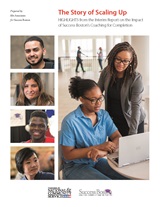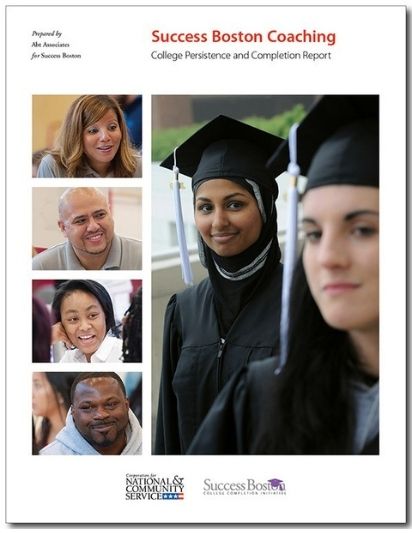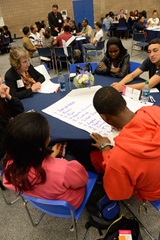Abt Associates researchers Tamara Linkow and Kelly Lack presented data on various metrics toward college completion—from persistence to credit accumulation to graduation—for participants over the first six years following high school. There has been improvement from baseline across all metrics—students who have a coach are more likely to persist from year to year, have more accumulated credits, and complete college at higher rates. At the same time, not all of these impacts are statistically significant, and their magnitude appears to wane over time. (The full report is available online.) Researchers also looked at impacts before and after an expansion of the program in 2015, when its scale tripled from 300 to 1,000 students from each BPS class. While the larger cohorts saw smaller impacts, coached students were still more likely to persist in college for the first two years. Finally, the research did not uncover any consistent patterns by student characteristics like gender, race, or type of college.
The analysis yielded some compelling takeaways. Results suggest that two years of coaching may simply not be long enough, especially if students enroll in a four-year college. A review of similar programs across the country suggests that longer and more intensive coaching supports are beneficial. Programs that have increased college completion have typically also paired coaching with other supports, including financial aid and help with purchasing textbooks and laptops.
At the same time, thanks in part to the efforts of Success Boston, many local colleges have improved their own support services for all students on their campuses: from offering coaching to improved financial aid to creating learning communities and even operating student food pantries. These systemic improvements have helped to increase persistence for all students—coached and non-coached alike.
Abt Associates is continuing to follow the program, with a final report on college completion impacts anticipated for late 2022.
Panelists and Moderators
- Annabelle Cataloni, Postsecondary Team Manager, Boston Private Industry Council
- Liya Escalera, Vice Provost for Academic Support Services, University of Massachusetts Boston
- Karina Nova, Boston University Graduate and Success Boston Alumna
- Antoniya Marinova, Director, Education to Career, The Boston Foundation (Moderator)
- Jade Franco, Program Officer, Education to Career, The Boston Foundation (Q&A Moderator)
Moving from numbers to narrative, Success Boston student/coach duo Karina Nova and Annabelle Cataloni (see titles in the sidebar) shared the story of how they were first paired at Bunker Hill Community College. Nova was an active participant in the program, transferred to Boston University to earn a bachelor’s degree, and now is working in the student support field herself. (“I won’t feel successful unless I bring someone up with me,” she says.) She stayed in touch with Cataloni, even though the formal coaching period was complete. Cataloni valued that, noting that many coaches maintain contacts with students long after their initial connection, but also noting that some students are not as forthcoming and need more intentional outreach to make sure they are on track. Even though coaches are passionate about their work and purpose, this can lead to burn-out.
Fellow panelist Liya Escalera represented institutional expertise as a vice provost at UMass-Boston, and emphasized that alongside the important support of one-on-one coaching, we need systems change. “We need to acknowledge that schools were not designed for marginalized students … and think about the historical forces that brought us a system rooted in inequity. While there are immediate fixes needed, some changes have to be knit into the organization’s long-range plans and strategy. We need to ask what coaching can teach us about our responsibilities. The key is listening: What is challenging to students about the system as it is? Where are the pain points in the journey? We have to listen to Success Boston pairs as experts in the flaws of our system.



